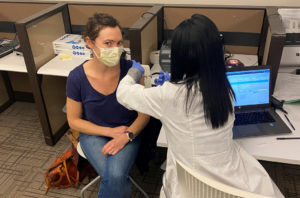Share:

Late one afternoon, ATRMC Security received a call from one of the screeners at the main entrance who reported a heated domestic argument taking place outside. It’s not uncommon for security to be called for such matters, and at Asante Three Rivers our security team is well-trained to respond using a trauma-informed care model.
As the two security officers approached the main entrance they heard a young woman yelling from a nearby parked vehicle. Sitting on a bench in front of the hospital was a young man, Jim*, who confirmed he was with her. Jim told the officers that his friend Stacy had stopped taking her medication and had become violent. Jim didn’t feel safe around her when she was being unpredictable and thought she wouldn’t act out or become violent with him as long as they were in a public place.
Stacy continued to yell and scream at Jim while the officers spoke with him. When the officers walked over to the car to talk with Stacy, her emotions shifted from angry to sobbing to a blank expression. As she spoke with the officers, she would occasionally turn her attention to Jim and get extremely angry. The officers calmly redirected her attention back to them and continued asking questions to understand what was going on.
The security officers spent about 45 minutes talking with Stacy, and several times offered to get her help. Asked if she was suicidal she immediately answered, “No.” But when they asked if she had thoughts of hurting other people she got quiet and didn’t answer. One officer asked again and she very quietly answered, “Yes.” After confirming he had heard her correctly, the officer again asked if she wanted help and to be seen in the ED. Stacy finally stated that she did want to be seen and the officers escorted her to the ED to get checked in.
Security is responsible for ensuring a safe and secure environment for visitors, patients, physicians, staff and property. Besides purposeful rounding, our officers use a person-centered, trauma-informed approach to de-escalate tense encounters in a way that can help an agitated person regain self-control. By showing respect, listening and asking caring questions, and offering support, these two officers were able to defuse the situation and get Stacy the help she needed.
*Names have been changed to protect privacy.
If you have a question, please contact the author or relevant department directly.



